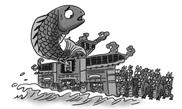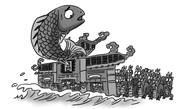Socialist measures can restrain damage of market
The achievements of China's reform and opening-up have attracted worldwide attention. However, in the past 30 years, market competition has simultaneously caused economic development and social polarization. Social polarization and the hatred of the rich are distinctly linked. So it is essential for Chinese government to prevent social polarization while developing the economy.
Public watchdogs can help close unfair wealth gap
Social polarization is the crucial barrier for China's development. But it is contra-factual to treat social polarization in China as the result of the role of the market economy in the opening-up process.
Classes calcify as poor kids disappear from best schools
China's poor once had faith in the magic of education to reverse their destiny. Folk wisdom describes entering a college as "a carp leaping over the dragon's gate." But now it seems rural small fry may carp about their fate, as the dragon's teeth have been sown amid the dwindling enrollment of students from poor backgrounds in the nation's top-tier universities.
Higher education about more than top school numbers
People are understandably worried about the plunge in the numbers of rural students at Tsinghua and Peking University, China's two top schools.
China's problems no excuse for ignoring rightful criticism
There is no need to answer questions like "Whether the Western news system or journalism values have anything to do with the hacking row" now. Rupert Murdoch and his defunct News of the World were hunted down simply because they had gone too far.
Politics must consider more than economic factors
Modernization does not only refer to economic development, but also involves many other social and political subjects.
East Asian model strikes balance of power and rights
<br />
In the process of industrialization, these countries and regions have all adopted systems that both ensure public rights and concentrate state power.
Broken jobs, slashed services led to London burning
As the draconian public spending cuts enforced by British Prime Minister David Cameron's coalition government take effect, the prognosis for the UK does not look good.
Looters show ugly reality of UK's father-less underclass
What really shows that this is a cultural problem is the contrast between the looters and those who turned out to defend their communities, like the Turkish shopkeepers in London and the Sikhs in Birmingham.
Murdoch scandal doesn't tarnish all Western media
Over the past few weeks as the News of the World phone hacking scandal has unfolded, several Chinese media outlets have gleefully reported the events.
Rage inevitable when popular power has no other outlet
The fatal crash took place in Wenzhou at around 20:00 on July 23. The tragic information soon spread over the microblogs. Netizens, angry or sober, stayed awake for the whole night.
Violence must be condemned, not rationalized by principles
The world was shocked by the hideous violence that broke out in Norway, supposedly one of the most peaceful countries in the world. The event would not surprise us as much had it taken place in the US, where gun violence is unceasing.
Metropolises needs guts to seek unique creations
As the saying goes, no destruction, no construction. A firestorm ensued after the release of plans for a new building to be built on the Bund in Shanghai by SOHO China recently.
Profit motive will never create architecture for the ages
Shanghai's Bund is the most famous street in China, a collection of colonial buildings of both historical and architectural importance. Plans by SOHO China to add a 31-story office building on the Bund have drawn wide criticism from locals, since the building is seen as bizarrely shaped and far too tall.
Precise ethnic translations can thwart separatists
An article titled "I'm not Chinese, I'm zhongguo ren" published on June 14 by the Global Times raised a serious and long-standing issue. That is, China has been a multi-ethnic country since ancient times, though various ethnic groups experienced very complicated conflicts. But in various Western languages, the translated terms relating to "zhongguo ren" and Chinese ethnic groups are confusing and could hardly represent the view that China is a unified family with various ethnic groups. This seriously misleads foreigners, especially Westerners.
'Chinese' still covers every citizen of a diverse nation
The Global Times published two articles about the translation of "Chinese" and "zhongguo ren" on June 14 and June 18. I think that understandings on the two words could not be based on historical sentiments. Neither can we impose some regional and national history explanations on the two words. In other words, we should not politicize the word "Chinese."
Zhu Min bears weight of a nation in new IMF role
New IMF director Christine Lagarde's campaign pledge to allow emerging markets more power at the IMF has now taken definite shape with the nomination of Zhu Min, the special advisor to her predecessor Dominique Strauss-Kahn, as a deputy managing director of the IMF. It is the first time a Chinese citizen has held so high a position within the IMF.
One man not enough to push fundamental change at IMF
The new IMF Managing Director, Christine Lagarde, nominated Zhu Min to be one of her deputies on July 12. If the nomination is approved, Zhu will become the first Chinese deputy managing director at the IMF since its foundation in 1944.




